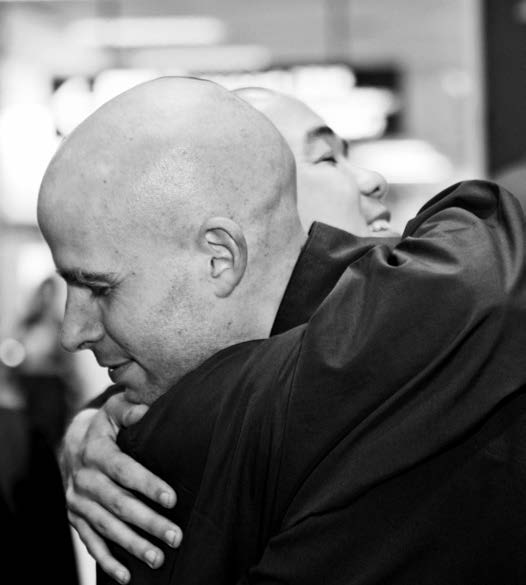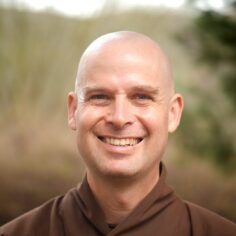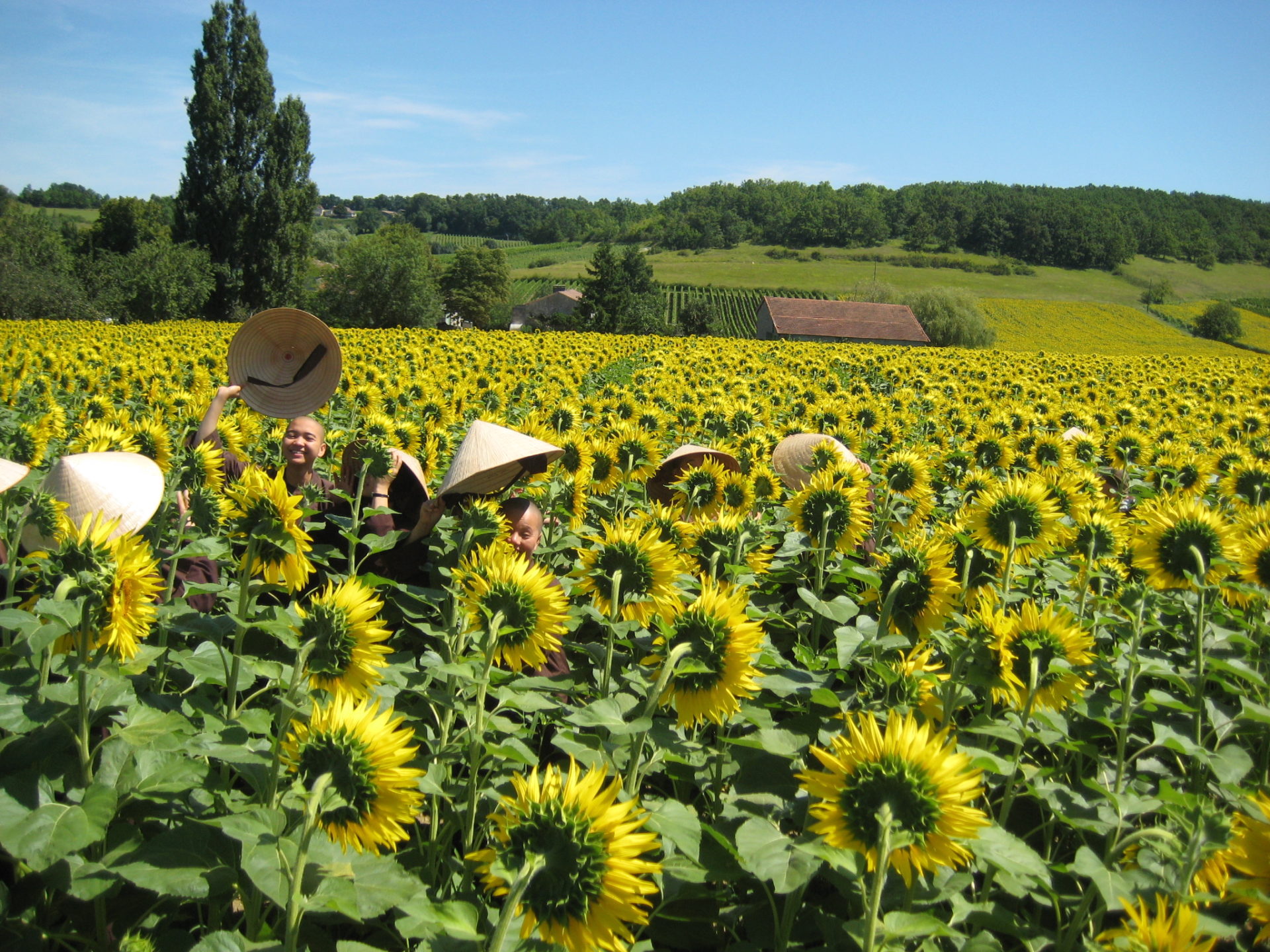Interview with Brother Phap Luu

A Wake Up reporter sat down with Brother Phap Luu (Brother Stream) on a sunny summer day in Plum Village, and they chatted about this thing called “community” and everything that comes with it.
What’s the most important thing you have learned as a monastic?
Brotherhood and sisterhood: the importance of practicing together.
Interview with Brother Phap Luu

A Wake Up reporter sat down with Brother Phap Luu (Brother Stream) on a sunny summer day in Plum Village, and they chatted about this thing called “community” and everything that comes with it.
What’s the most important thing you have learned as a monastic?
Brotherhood and sisterhood: the importance of practicing together. That is something you learn in every moment in the monastery by living, eating, walking, suffering, and being happy together.
I came to the path to deal with my suffering, with stuff that was happening with me, but the most important thing I encountered in Plum Village was brotherhood and sisterhood. This is really what we need to be able to change the world, especially amongst young people. There is a lot of mistrust in the world. Love for your neighbour is not always there; you do not even always know who your neighbour is. But if you nourish the seed of brotherhood and sisterhood in your mind and in your way of acting with your friends, family, and even strangers, it will manifest. This seed is nourished here in this community.
It is a practice every moment. It is not always easy to live together. There are a lot of things that come up: preferences, judging, prejudice…but you have to let go of your ideas about yourself, your pride, jealousy, and desire. You just have to be completely present in the moment, and then all of that will go away. That is how the path of the Buddha—the Dharma—creates a Sangha. If we let go of our small idea of ourselves, what is left is a deep intimate connection with each other.
Sometimes certain practices, like meditation, can somehow actually build up our egos and make us more proud. So Thay is always reminding us to keep it real. And for me, this means that our practice has to have the quality of brotherhood and sisterhood. If your practice does not have that then something is not right. And that is also the core of Wake Up. Wake Up is about generating brotherhood and sisterhood.
How has your engagement with Plum Village affected your family?
It has brought a lot of happiness. At first they did not know what we monastics do. They thought that maybe I would go to a cave in the mountains, do meditation, and look at my belly all day long. A lot of us have that concept of monastic life. But in fact, in the Buddha’s time it was not like that at all. In the Buddha’s time the monastics lived and practiced together.
When my parents came, they started to see the family aspect of this practice. They were not only my parents but also the parents of the other brothers and sisters, who even called them Mom and Dad. They get the practice through that personal contact with the other monastics and retreatants. It just happens in a very natural way, without even any particular intention on my part.
What is your biggest dream for your practice and the community?
That we all wake up together in every moment. [Smiles] And the more we practice, the more that becomes reality, so it is a self-fulfilling dream. [Laughs] The more I am aware of how things really are, the more happy I feel. The more we are awake as a community, the more we remove the judging and anger. Plum Village might one day stop existing but as long as we continue to practice together, wherever we are, then that collective awakening is still going on.
I also have some more concrete goals, like the Wake Up Schools project: bringing the practice to teachers and through them to young people, so they may know how to deal with strong emotions. In the case of things like school shootings, if somebody had ever guided the killers as friends so they could learn how to embrace their anger, then this senseless violence might not have happened.
A project like this is just an extension of collective awakening. If the teachers are not happy and free, then they cannot share that with their students. So Wake Up Schools, too, is not about sharing techniques or a curriculum, but more about connecting with teachers and helping them to wake up in their own lives.

How did you get involved with Wake Up and Wake Up Schools?
There were a lot of seeds for Wake Up. When I was a novice more then ten years ago, we had already started doing retreats for young people here, although they were only very small. Then in 2005 Thay went back to Vietnam for the first time [after being in exile for almost forty years] and got in contact with a lot of young people on the tour. He saw that we were tapping into a huge potential. Moreover, after founding the Bat Nha monastery in Vietnam, he saw loads of young people coming there, leaving their jobs and studies to become monastics. So I think Bat Nha was a huge seed of Wake Up.
And then in 2008 Thay met with a few of us, including Brother Phap Ho, the current acting abbot of Deer Park Monastery, at the end of Thay’s third trip back to Vietnam. That is when Thay shared that he wanted to create a group called Youth for a Healthy and Compassionate Society, and that we should do something to help. Soon after that, some young people and monastics came up with a shorter title here in Plum Village: “Wake Up!”
At the time, I was living in Deer Park and a lot of young people had already been coming there. Doing our first Wake Up retreat and giving it that name helped to bring the young people together. That first retreat was one of the best experiences in my life as a monastic. I felt really touched by it. It really felt like a movement was happening.
When I came back to Plum Village in 2009 and connected with some of the younger monastics, we started organizing the first Wake Up tours. These had a big impact. I think somehow we hit the right nerve by organizing the tour as a community. There are a lot of solitary Dharma teachers traveling through the West, but it is much easier to create community when you show a community of monastics and lay friends that are actually on tour together.
How would you describe Wake Up to someone who has never heard of mindfulness before?
Wake Up is about transforming ourselves and our suffering, and helping others to transform their suffering by our example. We do that by being aware of what is happening in our body, in our mind, in the present moment. And we do it together, creating a community of young people who have that deep aspiration to transform themselves and, by doing so, transform the world.
We might start out seeing things in society that we want to change, but at some point we see that, in order to really change things in a meaningful way, we have to learn how to transform ourselves first. Doing that as a community really helps us. If we are just on our own we might think our practice is very strong, but we are actually not able to live in harmony with others or to transform conflict in a difficult situation.
We get a lot of strength and energy from this collective practice, especially as young people who want to live a meaningful life. When I finished college, I wanted to do that but I did not have a path for it. So now there is Wake Up, a family of spiritual friends who are there for you. And that is the greatest gift there is. [Smiles]
Reprinted with permission from wkup.org.


